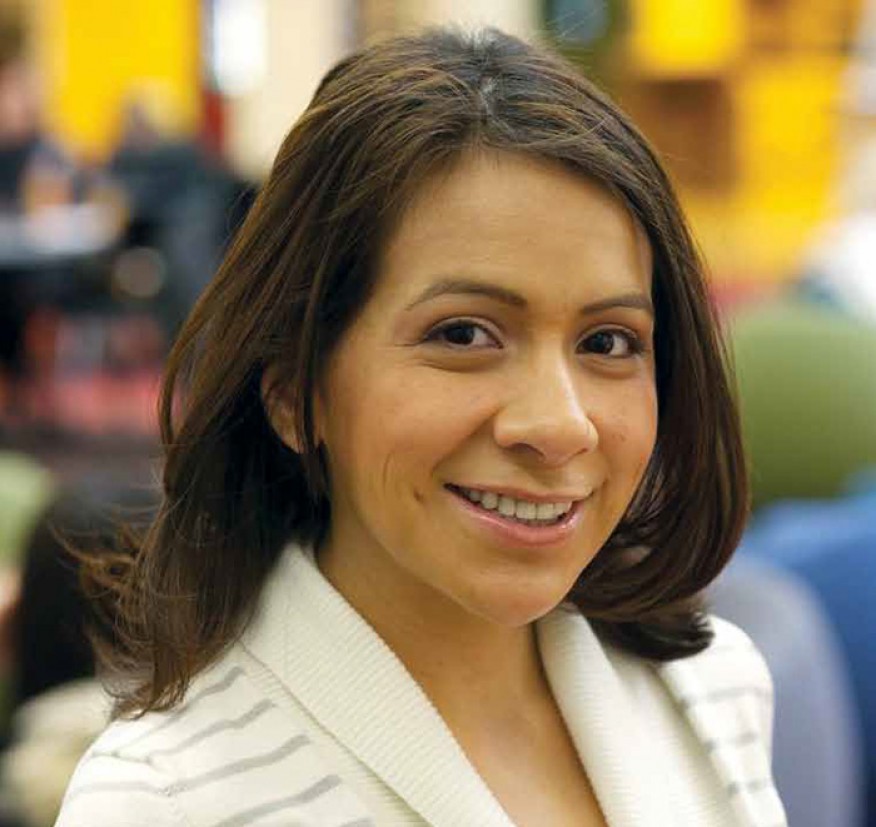Kristina Lopez, PhD ’13, has been referred to as the comeback kid. Today she is known as Assistant Professor Kristina Lopez, at California State University, Long Beach, where she’ll be applying her social work degree, analyzing national autism data to identify the needs of Latino children with autism and their families.
Never let anyone tell you, you can’t be what you want to be.
—Kristina Lopez
Lopez was driven by people telling her what she couldn’t do. Since the age of ten, she never allowed her epileptic seizures or two brain surgeries define her. She refused to believe that she was destined to settle for less of anything.
“Never give up or sell yourself short,” Lopez said. Never let anyone write you off because you’re sick.”
Lopez began having seizures at ten years old, was diagnosed with epilepsy at 13 and had her first brain surgery at 16. As a result of her surgery, she was placed in a gym class with special-needs students to protect the delicate area of her surgery. Her interest in autism began when she learned side by side with a classmate diagnosed with autism.
Within three years, the seizures returned, and at 21 years old, Lopez had a second surgery to remove more of her right temporal lobe.
“You can get to something bigger and greater through facing struggles,” Lopez said.
In spite of her health issues, Lopez completed her undergraduate degree with honors in psychology and masters in psychology from California State University. Her studies have since focused on intervention work with families of children with autism with an emphasis on Latino families.
“It appears that Latino families see the behavior of children with autism differently. It isn’t exactly clear what they’re experiencing with their child, but my research indicates that some Latino families are more accepting of the child and treat them as less of a burden to the family. For instance, some Latinos think a child with autism is what God has given them and they will play the hand they’re dealt.”
According to Lopez, many Latinos don’t necessarily have the language skills needed to successfully navigate school and health service systems. They may also be worried about their documentation status, or may not understand that it’s the child’s right to the services.
“In many cases, the children who need services are citizens, but their parents may not be. With autism, the system is complicated for all parents of all children, not just Latinos.”
Lopez began her doctoral program at U-M SSW in 2007, and completed her joint program of social work and developmental psychology in six years.
“I loved the joint program because a lot of my work was applied with an ecological and social justice approach. I wanted to understand what it means for a family raising a child with autism and how we can better serve their needs.”
During her studies, Lopez has presented and written several papers, including one about the feasibility of a culturally informed intervention for Latino families of children with autism. The paper is focused on promotoras de salud or community health worker, who work with Latina mothers to see if the intervention increases their knowledge base of services and strategies to work with their children. The data come from a collaboration with Dr. Sandra Magaña, who runs the pilot project in Milwaukee. The results indicate that with the help of Community Health Workers, Latino parents understand what autism is, have improved efficacy, and increasingly understand how to advocate for their children and themselves.
She has recently co-authored a paper with Magaña; Access to diagnosis and care among Latino children with ASDs in the June 2013 Intellectual and Developmental Disabilities.
Lopez is happy to return home to a job in California, which has the highest autism rate and the largest Latino population in the United States. She looks forward to focusing on sociocultural perspectives of raising children with autism and cultural informed interventions for Latino families.
Today Lopez has a wonderful husband, and a beautiful one year-old daughter and a career she’s very excited about.
“Never let anyone tell you, you can’t be what you want to be,” Lopez said.
